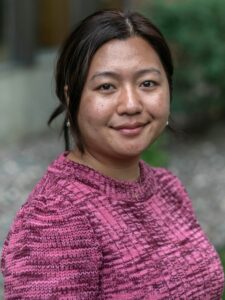 By Mercy Zou Taithul
By Mercy Zou Taithul
I grew up in a small town called Lamka, Churachandpur in the northeast of India. To be specific my street is call P. Kamdou Veng. (P stands for Phiamphu, the Chief of the street surname; Kamdou is his name; and Veng means street.)
I was surrounded by my close family, with my oldest auntie and her whole family living right opposite our house, and relatives also live in the house next to ours on the right. So, I grew up mostly with my siblings, cousins, and other relatives in the same neighborhood.
“The monsoon season blesses us, as pots and buckets are filled with water, kids run under the rain screaming with laughter, parents make paper boats for their kids, and everyone drinks garam (hot) chai/tea with family.”
Our neighborhood is a fun, friendly, loving, caring, and simple yet happy life. It’s a neighborhood where you can go to one neighbor’s house and borrow a glass or sugar, salt, rice, etc., and pay it back whenever. It’s a neighborhood where the doors and windows are wide open. It’s a place where you can walk into other homes without appointments; the open door signifies that we are home and you are always welcome in our house.
It’s also a neighborhood where there’s no such thing as daycare, though you don’t have to worry about your kids in times when you need it. Your neighbor will look after your kids for you and vice versa.
DURING THE SUMMER season (also the mosquito season!), the weather is warm and humid, but there is beautiful sunshine. It’s a time when we get to enjoy and share organic fresh fruits and vegetables – mango, jackfruit, greens, potatoes, and many others – from our backyard with family and neighbors.
On the one hand, the monsoon/rainy season blesses us, as pots and buckets are filled with water, kids run under the rain shouting and screaming with laughter, parents make paper boats for their kids, and everyone drinks garam (hot) chai/tea with family. On the other hand, there can be flooding, draining, and muddy roads. The water can get knee high, one reason why there aren’t basements like Albuquerque.
Pre-winter and winter season (November to February) is a busy season filled with weddings and holiday events such as Chavang Kut (a big day to celebrate the harvesting season on November 10. On that day, each tribe wears its traditional attire and performs it traditional bamboo dance, and so on. It is also a day to acknowledge hard-working farmers and to give thanksgiving to God.
“Before Christmas day the whole community celebrates Advant Christmas together by making a bonfire, creating music, and dancing in a circle by age categories.”
Most people get married during this time of year, probably due to the lack of strong rains. Wedding events are huge with hundreds of attendees. (Everyone from the neighborhood and community are invited.)
Christmas Eve, Christmas, New Year’s Eve, and New Year’s Day are celebrated within our own community (morning to night). We sing, dance, worship and eat together within our own congregation. However, before Christmas day the whole community celebrates Advant Christmas together by making a bonfire, creating music, and dancing in a circle by age categories (kids, young adults, youth, and older adults). Tea is available throughout the night, and the goal is really to just have fun and bond with others whether they are new or old members of the community.
Based on my experience growing up, I thought every neighborhood had fun together in ways such as these. When I began my study abroad, I realized that my new culture is completely different. This awareness makes me appreciate my original culture even more. I feel blessed to be a part of that community and neighborhood.
There are many other things that I would love to share with you – more details on how our weddings are celebrated, the jokes that we share, the living style and so much more. If you’re curious to know more, I am more than happy to share with you.
